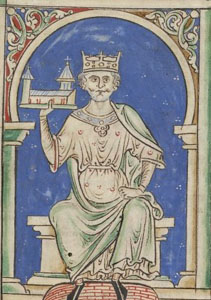On This Day: Death of William the Conqueror
Posted on
This day in 1087 saw the death of England's first Norman king, William the Conqueror.
The Bastard
At his birth, no one could have predicted that William would one day become King, even becoming a Duke seemed unlikely. His mother was a woman named Herleva, the "mistress" (or "concubine", although both terms had different meanings than they do now) of Duke Robert of Normandy. The Duchy was almost constantly at war, Robert struggled to keep any kind of control, but he still found time to go on a pilgrimage to Jerusalem. He died on the return journey, leaving William (probably no more than nine years old) as his only heir.
Luckily for the boy he was supported by his great-uncle, until the man's death led to a power struggle. William grew up in a violent and dangerous world, his numerous guardians were killed, one of them was murdered in the same room the young man was sleeping in. As he grew older, William was able to take a more active role in his Duchy, with the support of King Henry of France.
Married Man
Sometime in the early 1050s William married Matilda of Flanders. They were banned from marrying by Pope Leo IX, but appear to have gone ahead anyway, and they may have been required to build the two monasteries at Caen that would eventually take up their attention.
By 1051, King Edward "the Confessor" of England was still childless and appears to have named William as his heir. William was not Anglo-Saxon, he and Edward were related through Edward's mother Emma of Normandy, who was the sister of William's grandfather. There were better claimants through Edward's paternal, Anglo-Saxon line, but being acknowledged as heir was enough for William to be a serious contender when Edward died in January 1066.
King of England
The Battle of Hastings was fought on 14th October 1066. By the end of the day William's rival, King Harold Godwinson, was dead. William was crowned King of England on 25th December 1066, and set about cementing his rule over Anglo-Saxon England.
William faced numerous revolts over the years in both England and Normandy. He and Matilda crossed the channel frequently to shore up support in both the kingdom and the duchy. Matilda and their eldest son, Robert, acted as regents in Normandy for William during his absences, but there were still points when William had to leave his kingdom to ensure that rebellions in Normandy were thoroughly silenced. Likewise, Matilda travelled to England with her husband for shows of strong family unity, and is believed to have given birth to her fourth son, Henry, while visiting England in 1068. Sadly William was predeceased by his wife, who died after an illness in November 1083. The last years of William's reign saw more troubles as his son Robert led rebellions with the help of King Philip of France.
William died in Normandy on 9th September 1087, leaving Normandy to Robert and England to his second son, William Rufus. He is buried in Caen, but it was England where he really left his mark.
____________
If you're a fan of William the Conqueror, you can also check out his badge!